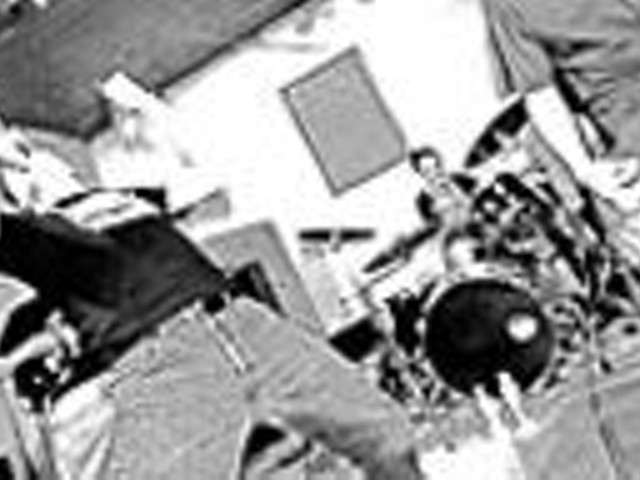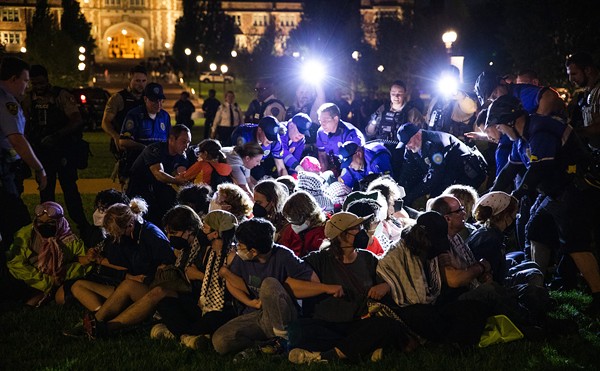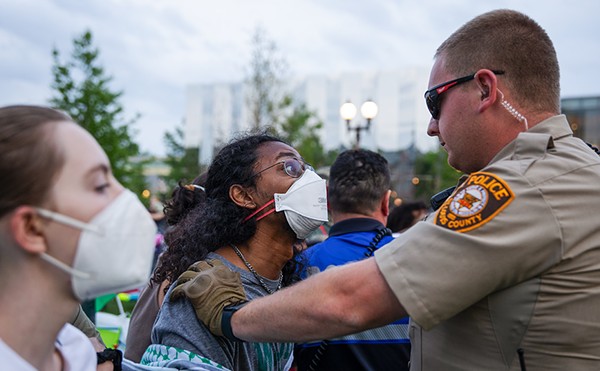Students describe the 55-year-old professor as "phenomenal," "invaluable" and "a jewel," and their written evaluations were uniformly glowing. "Bob Goss is a great, great teacher," gushed one student who took Goss' course on Buddhism. Another student called Goss' class on the afterlife "the most amazing course....I'd like to take his course even in my next reincarnation."
After ten years at Webster, tenure seemed a foregone conclusion for the academic star. Goss had more than 50 letters supporting his bid, a history of strong departmental evaluations and an initial recommendation from the tenure-review board. So it came as quite a shock when he discovered in April 2003 that his request had been denied.
Though the Committee to Review Faculty (CRF) had initially green-lighted Goss' tenure, David Wilson, dean of the School of Arts and Sciences, argued against it. Wilson cited one disgruntled student who had participated in an online version of Goss' Templeton Prize-winning class, "The Problem of Evil." Apparently Wilson's reasons were compelling, and the committee soon reversed its recommendation -- effectively killing not only Goss' bid for tenure but also his future at Webster University.
The decision quickly turned Webster's bucolic campus into a battleground. Students protested the decision, encircling Wilson and demanding an explanation. "How dare you snicker and pretend to smother a grin when students come to you and call you to account for your prejudice," read one student editorial excoriating the dean.
As Goss appealed the decision, the campus was rife with charges that interdepartmental politics, Wilson's career ambitions and homophobia influenced the dean and the CRF.
"It's a covert script of homophobia," says Goss, who is not only one of the nation's foremost authorities on queer theology but also has been openly gay since his arrival at Webster. "I'm convinced of that. I'm an embarrassment because of the things I write publicly. I'm not the right type of homosexual -- the 'heterosexual homosexual' who doesn't open their mouth and get themselves in the public limelight."
With publications such as Queering Christ: Beyond Jesus Acted Up, Goss has been a high-profile advocate for the fair treatment of gays in St. Louis. Soon after the book's publication, a public-safety officer at Webster vandalized Goss' office, scrawling "Faggot" on his office door and placing a slab of rotting meat in the carved-out pages of the book's predecessor, Jesus Acted Up. The safety officer was forced to resign.
To hear Goss tell it, professional jealousy also played a part in the no-tenure decision. "I made folks look bad," he says. "I could teach three or four classes a semester. I published. I was involved with students. I was lecturing around the country. That's intolerable in a place that wants to pride itself that it's doing well because it's only teaching."
Dean Wilson would not comment on the reason for denying Goss tenure, nor would any member of the Committee to Review Faculty. When reached by phone while touring Webster's European campuses, Wilson would only say, "The university went above and beyond the call of duty not only to be fair, but to appear fair."
Nonetheless, Wilson and the CRF appear to have relied heavily on six letters from faculty and alumni that argued against tenure. Add to that the dean's account of one disenchanted student who participated in an online course, and the negative reviews outweighed the hundreds of positive letters that subsequently poured in. The result: Come graduation, Goss will be out of a job.
"In my 30 years here, I know of no other case in which the departmental review was completely ignored," says Dennis Klass, current chair of Webster's department of religious studies. "It is a mystery to me how one student in an online course for which there was no official evaluation form provided by the university outweighed everybody else."
Music professor Steve Schenkel put it another way: "If Bob was such a terrible teacher, why were the students so flipped out?"
Still, the half-dozen letters paint an unflattering portrait of Goss. They describe him as an arrogant, sexually obsessed, vindictive gossip who arbitrarily attacks those with whom he disagrees. One letter accuses Goss of telling a student leader to step down from her post in the campus's gay and lesbian group. Another alleges Goss threatened an adjunct professor, telling him he could be fired at any moment.
But Goss' real crime, the letters allege, is his prurient interest in sex. "Bob Goss has hurt students, other faculty members, and me," reads a letter from one anonymous faculty member who describes an incident in which Goss outed her as a lesbian to students. "He has shown no remorse for doing so. I refuse to overlook, excuse, or bless his hurtful and arrogant behavior. I hardly view it as grounds for retaining someone, perhaps for decades, in a position of power and influence. I hope you do, too. Our students and faculty deserve better."
Another anonymous letter writer complains that "Bob seems to be obsessed with the sexual orientation of individuals in the Webster community....He has questioned members of the faculty about my sexual preference and disclosed my sexual preference without my permission in inappropriate contexts. I feel that Bob's behavior victimizes and condemns individuals that do not conform to his definitions of 'gay, lesbian, or bisexual.'"
Goss and his supporters counter that the damning letters do not address his solid professional qualifications. "It was clear that some of the letters that came in that were negative were personal," and had "nothing to with academic criteria," says Earl Henry, a music professor who assisted Goss in filing an appeal for tenure.
A handful of students complained that Goss had sex on the brain. "Everything is related to sex. Everything!" reads one student's evaluation of a course Goss taught on Hinduism. He "mentioned his homosexuality far too often," wrote another student while evaluating the course "Possibilities of the Afterlife."
Despite all that, it seems it was the unhappy online student who contacted Dean Wilson in December 2002 who ultimately doomed Goss' tenure bid. The student accused Goss of ignoring student e-mails, neglecting the online discussion boards and contacting the class only for procedural matters.
Wilson writes that when the student approached Goss, "His response was to take offense, scold her, and shift the blame." Wilson further asserts that Goss did not provide online course evaluations and tried to buy students' silence by awarding A's to more than 60 percent of the class.
Goss defends himself by saying he had no institutional support from the university while pioneering a new teaching format. He insists that the course was beset with technical problems and that no online evaluation form was available. He also argues that grade inflation is commonplace at Webster.
But mainly, Goss points to his teaching record. "This is like receiving a parking ticket and getting capital punishment," he says. "I got students into [graduate] schools that the university had never got them into: Harvard, Yale, Claremont, Vanderbilt. We just got two students into the School of Oriental and African Studies at the University of London."
Goss' departure leaves the department of religious studies with only two full-time faculty members and scrambling to fill its roster. "People who might have considered that position looked at what happened to Bob, and I believe -- I have no proof, obviously -- that that affected the field of candidates," says Klass, the department chair. "It's devastating."





